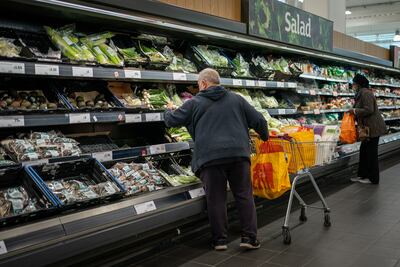About half the adults in the UK are buying less when they go shopping for food and concern over Christmas food prices is far higher than last year, according to data from the Office for National Statistics (ONS).
The poorest appear to be the hardest hit, with 61 per cent of those living in the most deprived areas buying less food compared with last year, as opposed to 44 per cent in the least deprived areas, the ONS said.
Despite overall inflation, including housing costs, falling slightly last month, food and soft drink inflation rose 16.5 per cent, the highest increase since September 1977.
Price increases for food and soft drinks are having the greatest effect on record when it comes to driving up the overall inflation rate. They added 1.51 per cent to overall inflation in November, the largest contribution since the start of the National Statistics series in 2006.
Basic everyday food items recorded sharp increases in prices. For half of the items in a basket of 30 basic grocery products, prices rose by more than the official rate of food price inflation of 15 per cent between September 2021 and September 2022. Three of those items posted price rises of above 40 per cent: vegetable oil (65 per cent), pasta (60 per cent) and tea (46 per cent).

With Christmas only days away, 81 per cent of adults surveyed by the Food Standards Agency (FSA) said they were concerned about the cost of food during Christmas and New Year, up from 62 per cent in the same period last year.
Missed meals
The FSA also found rising food prices might be having a knock-on effect on health, with nearly a quarter of survey participants saying they had skipped or reduced the size of a meal because they could not afford to buy food.
The latest ONS opinions and lifestyle survey found 16 per cent of adults in Britain were somewhat or very worried their food would run out before they had money to buy more, while 6 per cent said their household had run out of food and could not afford more.
In further gloom for the UK hospitality sector, the survey also about three in five adults reported eating out less, both at restaurants and ordering in takeaways.
The inflation gap between low and high-income households is at its largest since March 2009, the ONS said. In the year to October, annual inflation was 10.5 per cent for low-income and 9.1 per cent for high-income households.











